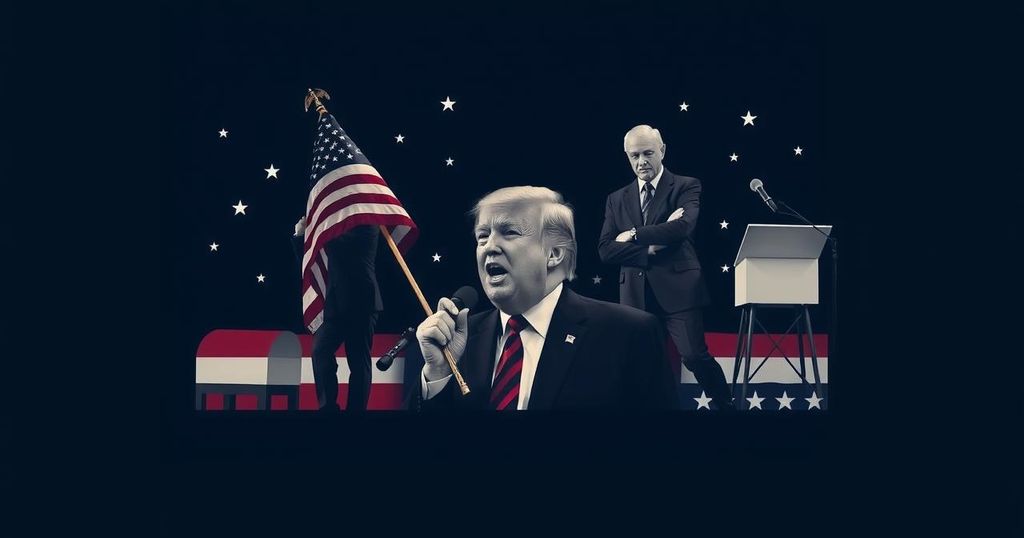The article posits that a potential second term for Donald Trump poses an extinction-level threat to American democracy, likening the risk to a precariously unbalanced Jenga tower. The Author notes Trump’s plans and actions to politicize government, undermine institutions, and exacerbate divisions. Historical cases, specifically Hungary under Viktor Orbán, illustrate how democracies can fall into authoritarianism. The narrative warns that the implications of a Trump presidency could irreversibly harm public faith in democratic processes and structures, leading to a cataclysmic erosion of civil governance.
The stakes of the upcoming 2024 election for American democracy can be likened to a precarious game of Jenga, where each removed block destabilizes the structure further until it ultimately collapses. As the possibility of a second term for former President Donald Trump looms, there are alarming implications for the integrity of democracy in the United States. Amidst a global landscape where once-stable democracies are crumbling into authoritarian regimes, the risk of a Trump presidency further eroding democratic norms and institutions cannot be overstated. Trump’s proposals and intentions, exemplified in documents such as Project 2025, suggest a systematic plan to reshape the government to serve his personal agenda, including the recommendation to dismiss thousands of career civil servants. This alarming strategy threatens to politicize the civil service, undermining the functionality of government and diminishing democratic integrity. The gradual dismantling of democracy does not rely solely on overt actions like suspending elections; instead, it involves a stealthy erosion of democratic institutions, making it more difficult for opposition voices to prevail. Several historical precedents exist: Former democracies have descended into autocracies through systematic control and manipulation. Prime Minister Viktor Orbán of Hungary serves as a cautionary example, having methodically seized power in a nation once considered a democratic role model. The potential parallels to Trump’s approach to governance present a distinct possibility that a second term could follow a similar trajectory. A critical question remains: Will the electorate empower Trump to implement this alarming vision, thereby placing American democracy at significant risk? Despite arguments claiming that democracy withstood Trump’s first term, it is crucial to recognize that democracy emerged weakened and destabilized. The aftermath of his initial presidency demonstrated escalating tensions and declining trust in governmental institutions. If Trump were to secure a second term, the dangers could magnify, as he would be better equipped to pursue an orchestrated agenda aimed at manipulating the political landscape to favor the Republican Party. While the outcomes are uncertain, the ramifications of a second Trump term could lead to catastrophic political violence, potential global conflict, or ongoing failures in governance and public health. Such distressing possibilities highlight the need for voters to consider the implications deeply. The continuity and trust woven into the fabric of democracy may erode significantly under deliberate attempts to undermine established norms. The challenge lies in the potential for a shift from a cycle of trust-building, as articulated by political philosopher John Rawls, to a vicious cycle marked by distrust and disintegration of democratic values. A second presidency under Trump threatens the core of what supports democracy: a reliable government, public faith in electoral processes, and a shared commitment to democratic ideals. The outcome of the 2024 election could ultimately determine whether American democracy stands resilient or collapses entirely under the weight of authoritarian tendencies.
The article discusses the potential consequences of a second Trump presidential term on American democracy, employing the metaphor of the game Jenga to illustrate the fragility of democratic institutions. It references historical examples of democratic erosion, particularly focusing on Viktor Orbán’s Hungary as a case study for how democracies can decline into autocracies. The narrative explores how Trump’s past actions and future proposals threaten to dismantle crucial aspects of democracy, including the civil service, governmental integrity, and the overall faith of citizens in their political system. The author contextualizes these threats within the broader landscape of political antagonism, race, and national identity in the United States, emphasizing the need for voters to consider the significant stakes of the upcoming election.
In summary, the risks associated with a second Trump term represent an existential threat to the foundations of democracy in the United States. The potential for systemic dismantling of democratic norms, trust erosion, and increasing authoritarian tendencies underscores the gravity of the decision facing voters in 2024. This moment calls for careful consideration of the values and structures that uphold real democracy against the backdrop of a political landscape increasingly vulnerable to manipulation and abuse.
Original Source: www.vox.com






